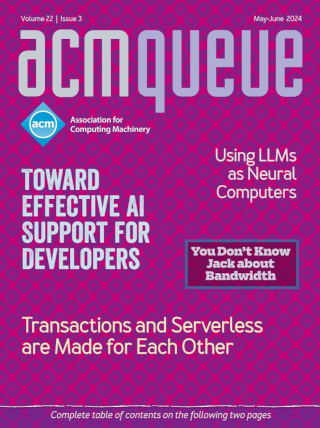
Lamboozling Attackers: A New Generation of Deception:
Software engineering teams can exploit attackers' human nature by building deception environments.
The goal of this article is to educate software leaders, engineers, and architects on the potential of deception for systems resilience and the practical considerations for building deception environments. By examining the inadequacy and stagnancy of historical deception efforts by the information security community, the article also demonstrates why engineering teams are now poised to become significantly more successful owners of deception systems.
Meaning and Context in Computer Programs:
Sharing domain knowledge among programmers using the source code as the medium
When you look at a function program's source code, how do you know what it means? Is the meaning found in the return values of the function, or is it located inside the function body? What about the function name? Answering these questions is important to understanding how to share domain knowledge among programmers using the source code as the medium. The program is the medium of communication among programmers to share their solutions.
Chip Measuring Contest:
The benefits of purpose-built chips
Alan Kay once said, "People who are really serious about software should make their own hardware." We are now seeing product companies genuinely live up to this value. It is exciting when the incumbents known as the chip vendors are being outdone, in the very technology that is their bread and butter, by their previous customers. Let's dive into some of the interesting bits of these purpose-built chips: the benefits of economics, user experience, and performance for the companies building them.
Federated Learning and Privacy:
Building privacy-preserving systems for machine learning and data science on decentralized data
Centralized data collection can expose individuals to privacy risks and organizations to legal risks if data is not properly managed. Federated learning is a machine learning setting where multiple entities collaborate in solving a machine learning problem, under the coordination of a central server or service provider. Each client's raw data is stored locally and not exchanged or transferred; instead, focused updates intended for immediate aggregation are used to achieve the learning objective. This article provides a brief introduction to key concepts in federated learning and analytics with an emphasis on how privacy technologies may be combined in real-world systems and how their use charts a path toward societal benefit from aggregate statistics in new domains and with minimized risk to individuals and to the organizations who are custodians of the data.
It Takes a Community:
The Open-source Challenge
Of the many challenges faced by open-source developers, among the most daunting are some that other programmers scarcely ever think about. Building a successful open-source community depends on many different elements, some of which are familiar to any developer. Just as important are the skills to recruit, to inspire, to mentor, to manage, and to mediate disputes. But what exactly does it take to pull all that off?
A Conversation with Margo Seltzer and Mike Olson:
The history of Berkeley DB
Kirk McKusick sat down with Margo Seltzer and Mike Olson to discuss the history of Berkeley DB, for which they won the ACM Software System Award in 2021. Kirk McKusick has spent his career as a BSD and FreeBSD developer. Margo Seltzer has spent her career as a professor of computer science and as an entrepreneur of database software companies. Mike Olson started his career as a software developer and later started and managed several open-source software companies. Berkeley DB is a production-quality, scalable, NoSQL, Open Source platform for embedded transactional data management.





